
BEIJING,— Sinopharm‘s COVID-19 vaccine elicited weaker antibody responses against the Delta variant, based on the first published study of its effect against the more contagious version.
Antibody levels in people receiving Sinopharm‘s BBIBP-CorV vaccine had a 1.38-fold reduction to the Delta variant versus an older version of the coronavirus first identified in Wuhan, a lab study based on samples from people in Sri Lanka showed.
The study was conducted by scientists from University of Sri Jayewardenepura as well as Colombo Municipal Council in Sri Lanka, and University of Oxford in the United Kingdom.
The Delta variant, first found in India late last year, has since become the dominant version of the virus worldwide and is behind a recent surge in infections reported in many countries including Britain, Indonesia, the United States and South Korea. It has been detected in more than 90 nations worldwide.
The vaccine from Sinopharm, formally China National Pharmaceutical Group, also showed a more pronounced 10-fold decrease in antibody levels to the Beta variant, first found in South Africa, the study, published on Monday ahead of peer review, showed.
Researchers said they found no significant difference in levels of antibodies to the two variants from blood serum of vaccinated people compared with the serum of those who had been naturally infected.
This suggested that Sinopharm‘s vaccine may be able to induce antibody-based responses against the two variants similar to the levels seen following natural infection, the paper said.
The two-dose vaccine is one of the most widely used COVID-19 shots in China, and Sinopharm agreed to provide up to 170 million doses to the global vaccine sharing scheme COVAX through to the middle of 2022. —Reporting by Roxanne Liu and Ryan Woo; Editing by Miyoung Kim and Jane Merriman









